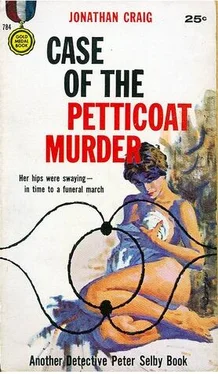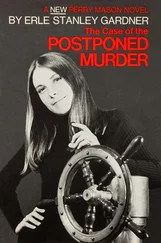“Hold on a minute while I find that damn sheet again… Yeah, here it is. The friend's name was Martin Hutchins.”
Martin, I thought; “Marty” for short.
“You got his address, Milt?” I asked.
“That's the only other thing I have got. It's nine twenty-three Bethune Street.”
I wrote the name and address in my book. “Anything else, Milt?”
“No, but you'd better get out that pickup on Burt Ellison. Ten to one, he's your boy.”
“I will,” I said. “Many thanks, Milt.”
“No trouble,” he said, and hung up.
Once again the phone started ringing almost instantly. But it was only Pickled Lil, a lonely old alcoholic who called the squad room at least twice a week to demand that we arrest her letter carrier because he never brought her any mail. I told her we'd arrest him that same afternoon, and then called Communications, gave them Burt Ellison's description, and asked that they broadcast a city-wide pickup on him. Then I reconsidered, and asked that they put the pickup on the teletype network that covers thirteen states and the District of Columbia. Communications fussed a little about the meagerness of the description; but there was nothing to be done about it.
When I had finished with Communications, I called the Chief of Detectives' office and requested the assignment of fifty detectives to full-time duty in and around Nadine Ellison's neighborhood for the purpose of learning as much as possible about her friends and associates, with particular emphasis on anyone thought to have used her apartment for assignations. The detectives were to be placed under the direction of Frank Voyce, an experienced man who would be responsible for the deployment of the other detectives and the evaluation of their reports, and who would be the only one of the special group with whom I would have direct contact. The group's primary objective was the collection of personal information about a specific individual, and not the investigation of a homicide. Each man would be furnished a copy of Nadine's picture, blown up from the snapshot Stan Rayder had taken from her dresser, and would be asked to watch very closely for reaction when he showed it to the people he questioned about her.
When I had completed working out the details, I hung up, took a blank folder from the supply cabinet, typed “Ellison, Nadine-Homicide” on the tab, placed the original UF 61 form inside it, and put the folder in the file drawer reserved for active homicides.
Next, after I had separated the picture of Nadine and Marty with a pair of scissors, I placed Nadine's half in an envelope, wrote both her and my names on it, and slipped Marty's half into my billfold.
Then I made one last call, to tell Stan Rayder about the arrangements I'd made for the fifty detectives under Frank Voyce, and that we now had, not only a line on Nadine's boy friend, Marty Hutchins, but also a brand-new, white-hot suspect in the person of her husband.
As I said so long to Stan, old Louis Lozeck came in with my quart container of coffee. He placed it on the corner of my desk and stood smiling down at me, the ends of his long white mustache looking a little frayed and his lined forehead a bit moist from his round trip.
“Never mind the change, Louis,” I said.
“The coins I will give to some small child, Mr. Detective Selby,” he said, smiling his beatific smile.
It was just a little fiction we indulged in. Louis' pride was too great to permit him to accept tips, even though he never had even so much as tobacco money; and so we had somehow fallen into this routine about his giving the tips to the little ones. A half-hour from now, Louis would make another trip to the corner, to return with some of the most incredibly vicious pipe tobacco I had ever smelled.
Louis Lozeck was the only citizen ever allowed to remain in the squad room alone; and I think the reason we'd made the exception was that the sight of the harmless old man enjoying his poisonous pipe in the chair by the door was the sole touch of gentleness in a place where, without him, it would have been unknown.
The coffee was too hot to drink. I took a few small sips of it in deference to Louis, picked up the envelope containing Nadine Ellison's picture, and went downstairs to leave the envelope at the desk and pay a call on Nadine's boy friend, Marty Hutchins.
NINE TWENTY-THREE Bethune Street turned out to be a rooming house, one of those once-elegant, high-stooped buildings that were originally residences of the rich and which, in New York, are almost always referred to as brownstones, despite the kind of building material used in their construction. In this case, the “brownstone” was actually a four-story whitestone, soot-darkened to within a shade or two of black.
I knocked on the door of the third-floor front, which, according to the list of roomers beside the mailbox in the tiny foyer downstairs, belonged to Martin Hutchins.
There was no answer. I knocked again, and was just starting to knock a third time when I heard the creak of bedsprings and the sound of heavy steps moving toward me across a bare wood floor.
The man who opened the door was bulky-shouldered and narrow-waisted, a wedge-shaped man with practically no hips at all. His dark hair was uncombed, his eyes were bloodshot, and his drawn, beard-stained face was sheened with sweat. He wore a slightly soiled white T-shirt, new-looking green chino pants and dark brown loafers with a very high shine.
He looked at me, grimaced, and started to close the door. “No,” he said. “Whatever it is, I don't want any.”
I caught the door with my hand and showed him my potsy. “Police officer, Mr. Hutchins,” I said. “I'd like to ask you a few questions.”
“So soon?” he said, standing back to let me pass inside.
“I was kind of hoping you'd wait a while.”
The room was small and hot and almost completely airless, and there was the kind of sweet-sour smell that comes from someone sweating out a protracted hangover. There was a narrow day bed, a straight chair with a stack of magazines on it, a cigarette-scarred dresser covered with mounds of odds and ends at either side of a clock-radio, and a bed table with a huge, butt-filled ash tray, a nearly-empty fifth of whisky, two scummy glasses and a dented, black-enamel carafe.
Hutchins took the magazines off the straight chair, dropped them on the floor and then sank down heavily on the bed. “Have a seat,” he said. “I didn't quite catch your name.”
I closed the door and sat down. “Selby,” I said. “Sixth Detective Squad.”
He tried to fashion a grin, but it didn't quite come off. “I was kind of hoping you'd let me die in peace,” he said. “Lord, what a head.” His voice had the soft, lazylike quality the bartender at the Hi-Lo had remarked upon, but it was far from a drawl; it was, in fact, one of the richest, most mellifluous male voices I'd ever heard.
“You were expecting me?” I said.
“Why, sure,” he said, reaching for the bottle. “Time for some more medicine. You want some?”
“No, thanks,” I said. “Why were you expecting the police, Mr. Hutchins?”
He took a long drag straight from the bottle, shuddered, took another, even longer one, and put the bottle down on the floor between his feet. “I heard it on the radio,” he said, nodding toward the one on the dresser. “Just about half an hour ago.”
I try always not to make assumptions in such cases, even when the reasons for making them are almost overwhelming.
“Heard about what?” I asked.
“Why, about Nadine,” he said, frowning puzzledly.
“What'd the radio say about her, Mr. Hutchins?” I asked.
“Not much. Just that she was dead, that's all.”
Читать дальше












